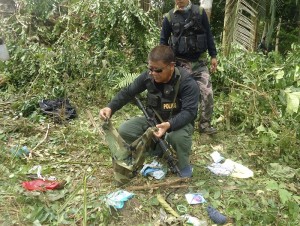Security officials have given different accounts of whether or not top Southeast Asian terror suspects Zulkifli bin Hir from Malaysia and Abdullah Ali from Singapore were killed in a recent military air strike on an Abu Sayyaf hideout in Jolo.
Not a single body was retrieved by police from the hilly jungle lair near Lanao Dakulah, fueling speculation on just who had been killed.
Regional military commander Major General Noel Coballes on Thursday said that Bin Hir, who used the name Marwan, and Ali, known as Muawiyah, were slain along with Abu Sayyaf commander Umbra Jumdail and 12 others when their camp was bombarded by two Philippine Air Force OV-10 Broncos delivering 227-kg bombs.
Two Philippine security officials with knowledge of the operation, however, told The Associated Press that new intelligence showed Jumdail along with his son and seven other terror suspects were killed but Marwan and Muawiyah were not in the vicinity.
The United States had offered a $5 million reward for the capture of Marwan, a US-educated engineer accused of involvement in deadly bombings in the Philippines, organizing terror training and plotting attacks.
Philippine security officials on Sunday said Jumdail and his group were planning new terror attacks, including kidnappings of foreigners and bombings, when they were slain.
Military spokesperson Colonel Arnulfo Marcelo Burgos said Jumdail’s death was a major blow to his al-Qaeda-linked group because he had harbored several Southeast Asian terrorist figures who provided funds and bomb-making training.
Charisma, big loss
“He had charisma and was the real link to foreign militants,” Burgos said of Jumdail. “He was a big loss.”
A few villagers, who were secretly working for the military, went up to Jumdail’s hideout pretending to seek medical treatment in order to leave some kind of sensor, which was later used by the bomber planes to zero in on the terrorists’ lair, one of the officials said.
Jumdail, also known as Dr. Abu Pula, had a knowledge of medicine and had drawn the loyalty of his men and poor villagers by treating ordinary illnesses and performing surgery, the official said.
The two officials spoke on condition of anonymity because they were not authorized to talk to reporters.


